On April 23, 2023, Mitchell Hooper of Canada lapped the final 460-pound Atlas Stone in the final event of the 2023 World’s Strongest Man (WSM) contest in Myrtle Beach, SC. When his gaze shifted from the floor to the 50-inch pedestal he was about to load the stone onto, the two-time WSM champion Tom Stoltman, who had just loaded all of his Atlas Stones, was Hooper’s nearest audience member.
When Hooper rolled the final Atlas Stone onto the pedestal, he knew he had secured his first WSM title one year after making his professional strongman debut to become the first Canadian ever to claim the most coveted title in the sport. Following his triumphant moment, Hooper sat down with BarBend to discuss the nuances, surprises, and expectations he had entering the competition and what it feels like not to be the World’s Strongest Man. Check it out below.
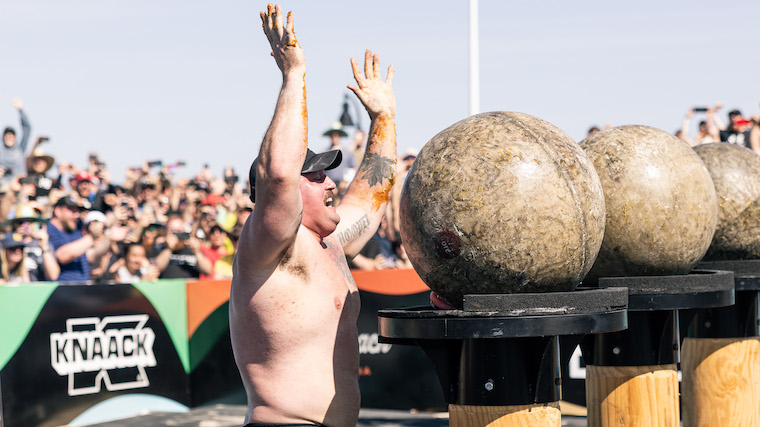
[Related: 2023 World’s Strongest Man Results and Leaderboard]
Editor’s note: The below interview is directly transcribed from the live in-person with Mitchell Hooper. Bolding has been added for emphasis.
Hooper won the 2023 WSM title with 53.5 points out of a possible 60 in the Final, which featured the 10 athletes who advanced from the Qualifying stage of the competition. His total was 4.5 points more than the runner-up Tom Stoltman and 12.5 more than the bronze medalist, 2020 WSM champion Oleksii Novikov.
Part of what helped Hooper capture a significant lead that seemed insurmountable for the rest of the competition by the final event is his intellectual approach to each event. He is routinely seen scoping out an event in such a way that he can execute more optimal techniques — both for his own physical positioning and for what physics will allow for. An example is how he used his phone to measure the slant of the street the bus pull occurred on.
BarBend: Do you think that the way that you approach the sport is where the sport is going to evolve to?
Mitchell Hooper: If I keep winning, certainly. It’ll force people to be that way. Knowing exactly what you have to do is very useful, and to be honest, I think the only difference for me is that I do a lot of that myself. Some guys have their coaches who do that for them, but I think when you get to this level, a lot of people approach it in a similar manner.
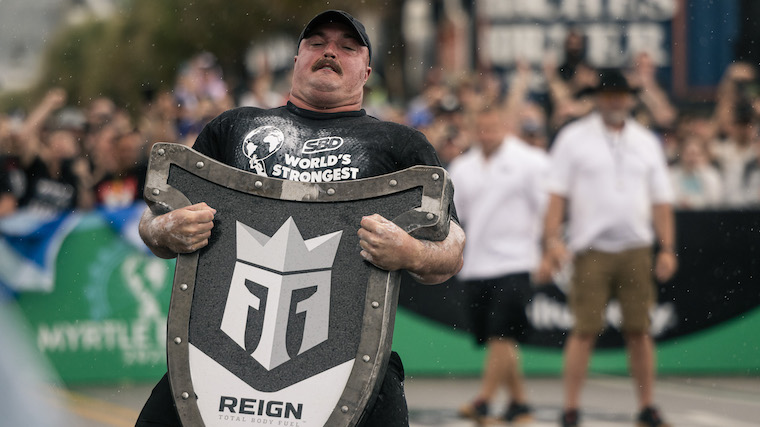
BarBend: Speaking of the way that you approach it…in the [Reign] Shield Carry, when you went up against Tom Stoltman…did you go in with the tactic of going slower than him to know the mark to beat or did you recognize in the moment that that was advantageous?
Note: for reference, in the Reign Sheild Carry event, Hooper and Stoltman were in the same heat. In an event for distance, Stoltman dropped his shield well ahead of Hooper. This let Hooper see the distance he needed to carry his shield to beat Stoltman in the event, and that’s what he did.
Hooper: I knew it’s advantageous to be slower, but you don’t want to hold that [shield] for any longer…so no…I just couldn’t keep up to [Stoltman]. He was just fast, and he was slipping. He made the turn, looks at me, sees that I was having trouble, and puts it down.
I heard the shield hit the ground, and I saw Tom looking at me…I thought, ‘All right, let’s see how this goes,’ and you hang on for dear life. Tom was the previous world record holder in that event. I knew if I’d beat his mark, that’d be a very competitive mark. I crab-walked my way to victory in that event.
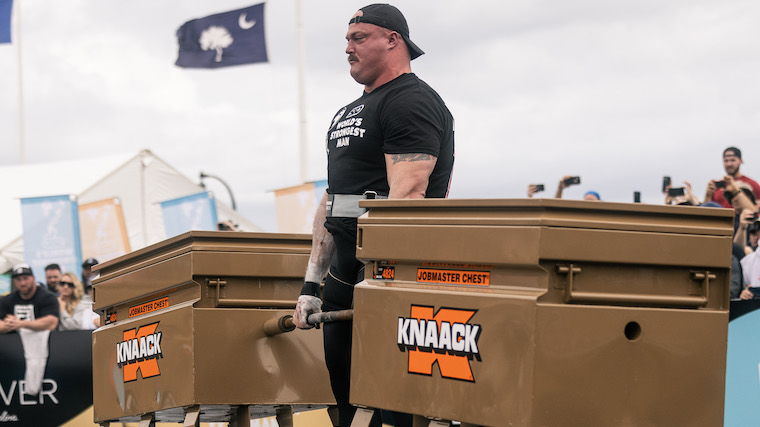
BarBend: Let’s talk about the leader’s advantage. The leader’s advantage in the event is when you score first in one event, you get to go last in turn order in the next event. How many points worth would you say that the leader’s advantage is weighted?
Hooper: Oh, it’s so hard to say because it’s a lot in energy conservation. Say on [KNAACK] Deadlift, I was earlier in the table; I might have been able to squeak out 10 or 11 reps, but what impact would that have had on my stone lifting or on my bus pull? When you lose your sympathetic drive, you’ll lose multiple, multiple points.
So if I had to estimate, let’s just use that deadlift as an example; if I did 10 or 11 and I went to max, it is very possible that that takes me a couple of seconds more on the bus pull, that costs you five points, and that cost me the title.
BarBend: You showed the most emotion during the Max Dumbbell event. Did you over-perform your expectation?
Note: for reference, Hooper successfully locked out a 140-kilogram heavy dumbbell to tie for first-place points in the Max Dumbbell event.
Hooper: Huge, huge. My max going into that was 127 kilograms. I said if I could hit a 135-kilogram dumbbell, I’d be very hard to beat for the championship. When I hit 132 kilograms, I thought that that was probably what I needed to win the show. When I hit 140 kilograms and split points for the win, it was just shocking. I still can’t believe that I put up a 140-kilogram dumbbell. It’s beyond me.
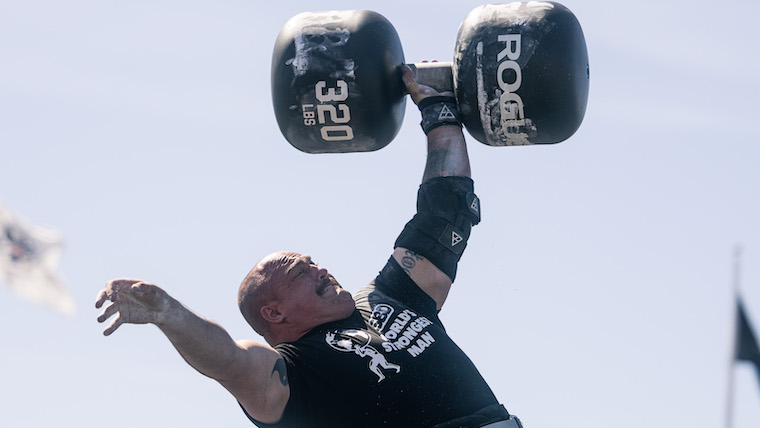
BarBend: Was that an all-time PR?
Hooper: 13-kilogram PR after 10 events, so highly unexpected. It’s amazing, actually. You figured everyone was accepting second to Brian Shaw on the Fingal’s Fingers and everyone was accepting second to Oleksii Novikov on the Max Dumbbell, neither of which happened. I think that’s a testament to how competitive the sport is at the moment.
Novikov hit a 132-kilogram dumbbell, and in a lot of competitions, that’s incredible; a lot of people can’t touch that. If you took all of our PBs (personal best), I hit a PB, Pavlo Kordiyaka hit a PB, Tom Stoltman hit a PB, Evan Singleton hit a PB — there are four guys who did something that they probably wouldn’t have expected of themselves.
BarBend: Do you go into these events like this and expect to hit PRs, or do you just take them as they come?
Hooper: You can’t expect to hit PRs in competition because it’s not in the comfort of your gym. Sleep’s not the same. I’ve found one of the hardest things this whole week is that every day getting up at 5:30-5:45 a.m. to get down for breakfast and get shuttled over.
It’s competition, especially at World’s, you’re on the TV’s time, and it’s a stop and go, and you’re cold, and you’re hot, and adapting to that is probably one of the keys to winning World’s Strongest Man, and I think I adapt as well as anyone.
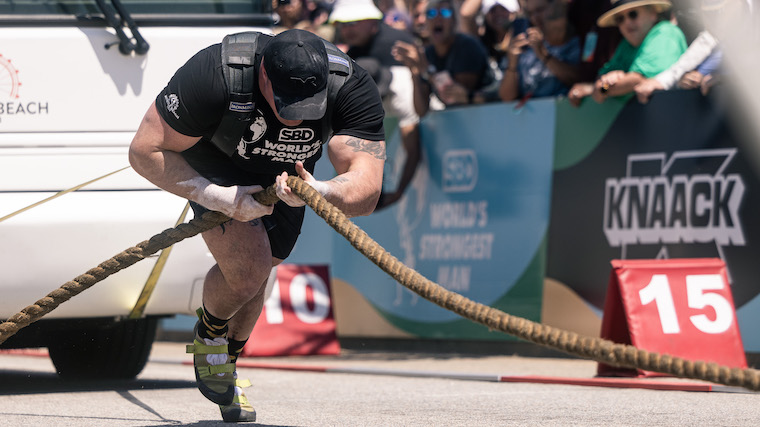
BarBend: In the Bus Pull, you went from never having done a bus pull last year to winning the event this year by more than two seconds. When you scored that time, were you expecting to be at the top?
I had the same situation on Fingal’s Fingers, where a second and a half took three points away; I got five, I would’ve got eight. I got off to a very good start on that bus pull. I trained in that really, really hard in lead up, and I’ve got all the tools to do something like that very well. It’s just a matter of exposure and having the technique.
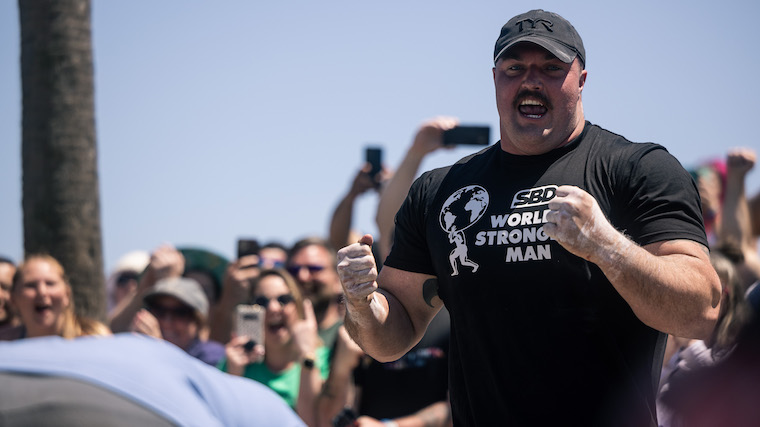
BarBend: When fans watch your performance back — going from eighth last year in your debut with some stumbles, never having done a vehicle pull before, the stumble on your Atlas Stones to being one of only three guys to load all five Atlas Stones in 2023 — what’re you hoping they take away from your performance?
Hooper: I just hope it shows people that you can accomplish a hell of a lot more than you think you can. One of the biggest challenges for me has been psychologically getting out of my own way and having that level of self-belief that I could be one of the best in the world. Even the same self-belief that you can lift 100 kilograms or you can squat pain-free or whatever it may be for each individual, I hope they see that in me at a macro level.
Featured image courtesy of World’s Strongest Man